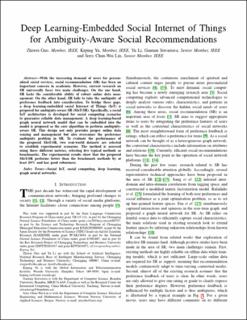| dc.contributor.author | Guo, Zhiwei | |
| dc.contributor.author | Yu, Keping | |
| dc.contributor.author | Li, Yu | |
| dc.contributor.author | Srivastava, Gautam | |
| dc.contributor.author | Lin, Jerry Chun-Wei | |
| dc.date.accessioned | 2022-05-03T12:41:23Z | |
| dc.date.available | 2022-05-03T12:41:23Z | |
| dc.date.created | 2021-12-24T20:36:57Z | |
| dc.date.issued | 2021 | |
| dc.identifier.citation | Guo, Z., Yu, K., Li, Y., Srivastava, G., & Lin, J. C.-W. (2021). Deep learning-embedded social Internet of Things for ambiguity-aware social recommendations. IEEE Transactions on Network Science and Engineering. | en_US |
| dc.identifier.issn | 2327-4697 | |
| dc.identifier.uri | https://hdl.handle.net/11250/2993950 | |
| dc.description | © 2021 IEEE. Personal use of this material is permitted. Permission from IEEE must be obtained for all other uses, in any current or future media, including reprinting/republishing this material for advertising or promotional purposes, creating new collective works, for resale or redistribution to servers or lists, or reuse of any copyrighted component of this work in other works. | en_US |
| dc.description.abstract | With the increasing demand of users for personalized social services, social recommendation (SR) has been an important concern in academia. However, current research on SR universally faces two main challenges. On the one hand, SR lacks the considerable ability of robust online data management. On the other hand, SR fails to take the ambiguity of preference feedback into consideration. To bridge these gaps, a deep learning-embedded social Internet of Things (IoT) is proposed for ambiguity-aware SR (SIoT-SR). Specifically, a social IoT architecture is developed for social computing scenarios to guarantee reliable data management. A deep learning-based graph neural network model that can be embedded into the model is proposed as the core algorithm to perform ambiguity-aware SR. This design not only provides proper online data sensing and management but also overcomes the preference ambiguity problem in SR. To evaluate the performance of the proposed SIoT-SR, two real-world datasets are selected to establish experimental scenarios. The method is assessed using three different metrics, selecting five typical methods as benchmarks. The experimental results show that the proposed SIoT-SR performs better than the benchmark methods by at least 10% and has good robustness. | en_US |
| dc.language.iso | eng | en_US |
| dc.publisher | IEEE | en_US |
| dc.subject | social IoT | en_US |
| dc.subject | social computing | en_US |
| dc.subject | deep learning | en_US |
| dc.subject | graph neural networks | en_US |
| dc.title | Deep learning-embedded social internet of things for ambiguity-aware social recommendations | en_US |
| dc.type | Peer reviewed | en_US |
| dc.type | Journal article | en_US |
| dc.description.version | acceptedVersion | en_US |
| dc.rights.holder | © 2021 IEEE | en_US |
| dc.source.journal | IEEE Transactions on Network Science and Engineering (IEEE TNSE) | en_US |
| dc.identifier.doi | 10.1109/TNSE.2021.3049262 | |
| dc.identifier.cristin | 1971934 | |
| cristin.ispublished | true | |
| cristin.fulltext | preprint | |
| cristin.qualitycode | 1 | |
